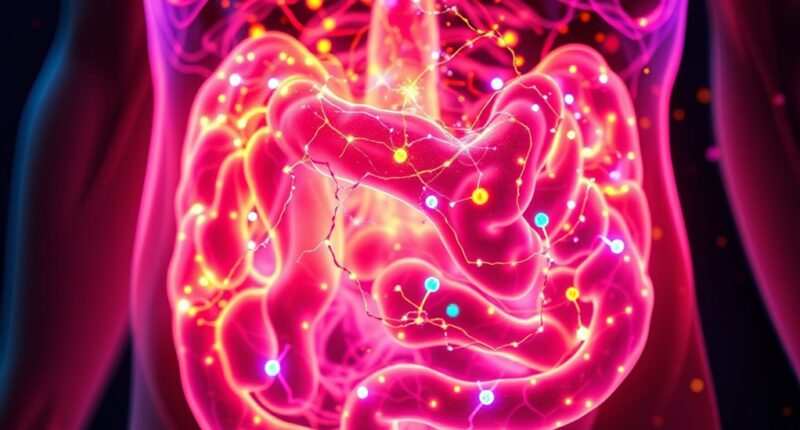The discovery of the gut-brain axis has revolutionized how anxiety is understood and treated. It reveals that your gut’s microbiome directly impacts your mental health by communicating with your brain through the vagus nerve. A diverse microbiome helps produce calming neurotransmitters like serotonin, reducing anxiety. Supporting your gut health through diet and lifestyle boosts this communication, promoting better mood and emotional stability. If you’re curious, there’s much more to uncover about this surprising connection and how you can harness it.
Key Takeaways
- The gut-brain axis reveals how gut microbiome diversity influences mood and anxiety regulation via neural and chemical signaling.
- A balanced microbiome produces calming neurotransmitters like serotonin, reducing anxiety symptoms.
- The vagus nerve acts as a communication pathway, transmitting microbial signals that impact emotional stability.
- Interventions such as diet, probiotics, and lifestyle changes can enhance microbiome diversity to alleviate anxiety.
- This discovery paves the way for personalized, gut-focused therapies as innovative approaches to anxiety treatment.

Have you ever wondered how your gut might influence your feelings of anxiety? It might sound surprising, but recent discoveries about the gut-brain axis reveal a complex communication network linking your digestive system to your brain. Central to this connection is microbiome diversity—the variety of bacteria, viruses, and fungi residing in your gut. A diverse microbiome isn’t just a sign of good health; it plays a pivotal role in regulating your mood and anxiety levels. When your gut microbiome is balanced and diverse, it can produce neurotransmitters like serotonin, which influences your feelings of well-being and calmness. Conversely, a less diverse microbiome can lead to dysregulation, increasing your susceptibility to anxiety and stress.
A diverse gut microbiome influences mood, reduces anxiety, and promotes calmness through neurotransmitter production.
One of the key pathways through which your gut communicates with your brain is via the vagus nerve. This long, wandering nerve extends from your brainstem down to your abdomen and acts as a direct highway for signals. When your gut microbiome is healthy and balanced, it sends positive signals through the vagus nerve, promoting relaxation and emotional stability. If your microbiome becomes imbalanced—due to poor diet, stress, or illness—it can send distress signals that activate your stress response, intensifying feelings of anxiety. The vagus nerve therefore functions as a critical mediator, translating microbial messages into neural signals that influence your mood.
Understanding this connection opens up exciting possibilities for treating anxiety. Instead of solely relying on medication, you can support your gut health through dietary choices, probiotics, and lifestyle changes aimed at increasing microbiome diversity. These efforts can enhance vagus nerve function and promote a calming effect on your brain. For example, consuming fiber-rich foods provides nourishment for beneficial bacteria, encouraging a diverse microbiome. Regular physical activity and stress management techniques can also improve gut health and, by extension, reduce anxiety symptoms. Researchers are actively exploring how targeted interventions that boost microbiome diversity and stimulate the vagus nerve can offer new, holistic approaches to managing anxiety.
This revolutionary understanding of the gut-brain axis underscores that your mental health isn’t just about your brain—it’s intricately connected to your gut environment. By taking steps to support your gut health, you’re not only improving your digestion but also fostering a calmer, more balanced mind. Recognizing the essential role of microbiome diversity and the vagus nerve in this dialogue empowers you to make informed choices that could profoundly influence your anxiety levels. As science continues to uncover this fascinating link, it’s becoming clear that caring for your gut might be one of the most effective ways to nurture your mental well-being.
Additionally, advancements in microbiome research are paving the way for personalized therapies that target gut bacteria to improve mental health outcomes.
Frequently Asked Questions
How Quickly Can Gut-Based Therapies Reduce Anxiety Symptoms?
You might notice some anxiety reduction within a few days to weeks of starting gut-based therapies, but it varies. Improving your gut microbiome through diet, probiotics, or lifestyle changes can influence your anxiety levels more quickly than traditional methods. Consistent efforts boost your gut health, leading to better mood and reduced anxiety over time. Stay patient and committed, as the full benefits often develop gradually with ongoing gut microbiome support.
Are There Specific Probiotics Proven to Ease Anxiety?
You might wonder if specific probiotics can ease anxiety. Research shows probiotic efficacy depends on strain specificity; not all strains have the same effect. Strains like Lactobacillus rhamnosus and Bifidobacterium longum have been linked to reduced anxiety symptoms. It is crucial to choose products with evidence-backed strains, as their benefits vary. Consult your healthcare provider to find the right probiotic for your needs and guarantee ideal results.
Can Diet Changes Permanently Improve Gut-Brain Health?
Think of your gut as a garden that needs constant tending. Dietary changes, like increasing microbiome diversity and adding more dietary fiber, can lead to lasting improvements in gut-brain health. While it’s not a quick fix, consistently nourishing your microbiome helps build resilience over time. By making these adjustments, you nurture a healthier gut, which can positively influence your mood and reduce anxiety for the long haul.
What Are the Risks of Manipulating the Gut Microbiome?
When you manipulate your gut microbiome, you should consider microbiome safety and probiotic risks. While changing your microbiome can improve health, it may cause unintended effects like infections or immune responses if not done carefully. Probiotics might introduce harmful bacteria or disrupt your natural balance. Always consult a healthcare professional before making significant changes, as these interventions can have risks if improperly managed.
How Does Stress Influence Gut Bacteria Related to Anxiety?
When you experience stress, it triggers stress modulation that can negatively impact your microbiome diversity. This shift often reduces beneficial bacteria and promotes harmful ones, which may increase anxiety. Your gut bacteria and brain communicate through the gut-brain axis, so stress can disturb this balance, leading to heightened anxiety symptoms. Managing stress helps preserve microbiome diversity, supporting better mental health and reducing anxiety-related issues.
Conclusion
Now that you’ve uncovered the gut-brain axis‘s secrets, imagine your body as a finely tuned orchestra, where your gut and brain play in harmony. When this symphony is disrupted, anxiety can take center stage, but with this discovery, you hold the conductor’s baton. By nurturing your gut, you’re guiding a delicate dance toward calm and balance. Embrace this newfound knowledge, and watch as the melody of peace and clarity begins to flourish within you.










